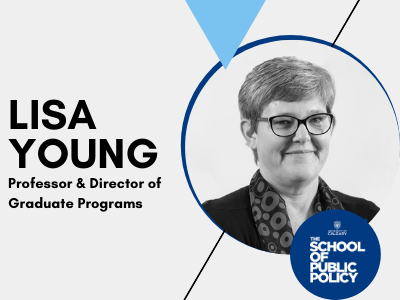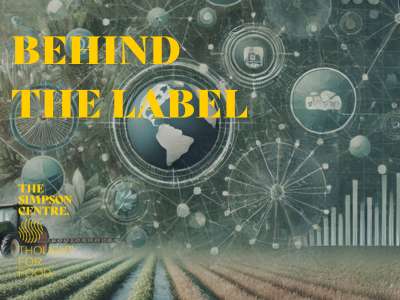Our People Feature: Lisa Young, Professor & Director MPP Graduate Program

The Master of Public Policy program at the University of Calgary has adapted to the challenges presented by the COVID-19 pandemic by implementing unique and innovative teaching initiatives, paying special attention to students’ needs.
“We were able to pivot quickly,” said Lisa Young, Director of Graduate Programs and a professor in the program.
“The MPP is an incredibly intense one-year program. We basically take people, in some cases with no background in public policy, and get them trained up to the Master’s level in 12 months and that is challenging under good circumstances. Everybody faced a huge challenge when we had to pivot last spring but it was really acute for programs like ours where there’s no space in the curriculum.
In some ways, it’s a small miracle that over three quarters of students will be graduating at the virtual convocation next month. We take that as a real success story.”
Young said a new group will be online for most or all of their program and the School of Public School is doing everything it can to give them an exceptional and intense experience under really challenging circumstances for everyone.
“The thing that we learned early and have had to carry through has been the need to be flexible. All the way through this I’ve balanced in my mind on the one hand a real imperative to be flexible and understand the situations that students find themselves in the midst of a global pandemic with our commitment to providing a really high quality education on the other hand. And those things are sometimes in tension with each other,” explained Young.
“We’ve gone out of our way to maintain our high standards while still being flexible and accommodating. And that’s meant learning to do things differently.”
Instructors have gone out of their way not to expect people to sit for three or four hours straight on Zoom but instead to recording lectures, having discussions in class, and everyone has taken advantage of getting exceptional speakers as a result of not having to limit themselves to Calgary.
“But we’ve also tried to keep doing things that are really the value-added of the program.”
One example is that in a couple of weeks it is going to have its first case week where students are given a challenge and will have an entire week to work on it. They will have a panel of judges to present to at the end of the week.
“That’s something we designed a year ago with the intention of being in person but instead it’s going to be on Zoom but we’re going out of our way again to bring in some of the top people in the field to talk to them, to give them background on the issue. We’re not limited to Calgary for who we can bring in. And they’re going to learn to present in this virtual environment rather than doing it in person,” explained Young.
Typically, the program has a class of 40. This year there are 35 students.


